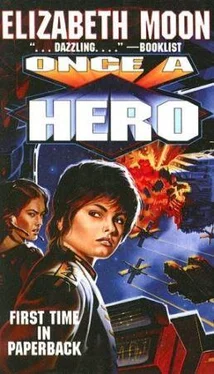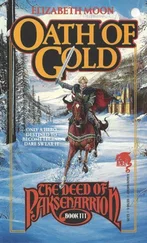Elizabeth Moon - Once a Hero
Здесь есть возможность читать онлайн «Elizabeth Moon - Once a Hero» весь текст электронной книги совершенно бесплатно (целиком полную версию без сокращений). В некоторых случаях можно слушать аудио, скачать через торрент в формате fb2 и присутствует краткое содержание. Жанр: Космическая фантастика, Боевая фантастика, на английском языке. Описание произведения, (предисловие) а так же отзывы посетителей доступны на портале библиотеки ЛибКат.
- Название:Once a Hero
- Автор:
- Жанр:
- Год:неизвестен
- ISBN:нет данных
- Рейтинг книги:3 / 5. Голосов: 1
-
Избранное:Добавить в избранное
- Отзывы:
-
Ваша оценка:
- 60
- 1
- 2
- 3
- 4
- 5
Once a Hero: краткое содержание, описание и аннотация
Предлагаем к чтению аннотацию, описание, краткое содержание или предисловие (зависит от того, что написал сам автор книги «Once a Hero»). Если вы не нашли необходимую информацию о книге — напишите в комментариях, мы постараемся отыскать её.
Once a Hero — читать онлайн бесплатно полную книгу (весь текст) целиком
Ниже представлен текст книги, разбитый по страницам. Система сохранения места последней прочитанной страницы, позволяет с удобством читать онлайн бесплатно книгу «Once a Hero», без необходимости каждый раз заново искать на чём Вы остановились. Поставьте закладку, и сможете в любой момент перейти на страницу, на которой закончили чтение.
Интервал:
Закладка:
Esmay began with the same background material. No one made comments, at least not that she could hear. All her displays projected right-side-up and correctly oriented . . . she had checked them repeatedly, but she’d had a nagging fear. This time, her recent research in mind, she added what she had learned about the Benignity’s methods, about the implications of Fleet protocols. Heads nodded; she recognized an alert interest far beyond the ensigns’ hunger for exciting stories.
When the questions began, she found herself exhilarated by the quality of thought they implied. These were people who saw the connections she had only just found, who had been looking for them, who were hungry for more data, more insights. She answered as best she could, referencing everything she said. They nodded, and asked more questions. She called for visuals, trusting that the Serrano ensign would get the right ones in the right order. He did, as if he were reading her mind.
“So the yacht didn’t actually get involved in the battle? Aside from that one killer-escort?”
“No, sir. I have only secondhand knowledge of this, but it’s my understanding that the yacht had only minimal shields. It had been used primarily to suggest the presence of other armed vessels, and would not have fired if the Benignity vessel hadn’t put itself in such a perfect situation.”
“It can only have confused them briefly,” a lieutenant commander mused from near the back. “If they had accurate scans, the mass data would show—”
“But I wanted to ask about that ore-carrier,” someone else interrupted. “Why did Serrano have it leave the . . . what was it? Zalbod?”
“It’s my understanding that she didn’t, sir. The miners themselves decided to join in—”
“And it shouldn’t have got that far, not with the specs you’ve shown. How did they get it moving so fast?”
Esmay had no answer for that, but someone else in Drive & Maneuver did. A brisk debate began between members of the D&M unit . . . Esmay had never been attracted to the theory and practice of space-drive design, but she could follow much of what they said. If this equipment could be reconfigured it would give a 32 percent increase in effective acceleration . . . .
“They’d still arrive too late to do any good, but that’s within the performance you’re reporting. I wonder which of them thought it up . . .”
“ If that’s what they did,” another D&M officer said. “For all we know, they cooked up something unique.”
Esmay snorted, surprising herself and startling them all into staring at her. “Sorry, sir,” she said. “Fact is, they cooked up a considerable brew, and I heard about the aftermath.” Scuttlebutt said that Lord Thornbuckle’s daughter had been dumped naked in a two-man rockhopper pod . . . supposedly undamaged . . . and the pod jettisoned by mistake into the weapons-crowded space between the ore-carrier and Xavier. Esmay doubted it was an accident . . . but the girl had survived.
Brows raised, the officer said, “I wonder . . . if they added a chemical rocket component . . . that might have given them a bit of extra push.”
The talk went on. They wanted to know every detail of the damage to Despite from the mutiny: what weapons had been used, and what bulkheads had been damaged? What about fires? What about controls, the environmental system failsafes, the computers? The admirals, who had sat quietly listening to the questions of their subordinates, started asking questions of their own.
Esmay found herself saying “I’m sorry, sir, I don’t know that,” more often than she liked. She had not had time to examine the spalling caused by projectile hand weapons . . . to assess the effect of sonics on plumbing connections . . .
“Forensics . . .” she started to say once, and stopped short at their expressions.
“Forensics cares about evidence of wrongdoing,” Major Pitak said, as if that were a moral flaw. “They don’t know diddly about materials . . . they come asking us what it means if something’s lost a millimeter of its surface.”
“That’s not entirely fair,” another officer said. “There’s that little fellow in the lab back on Sturry . . . I’ve gone to him a few times asking about wiring problems.”
“But in general—”
“In general yes. Now, Lieutenant, did you happen to notice whether the bulkhead damage you mentioned in the crew compartments caused any longitudinal variation in artificial gravity readings?”
She had not. She hadn’t noticed a lot of things, in the middle of the battle, but no one was scolding her. They were galloping on, like headstrong horses, from one person’s curiosity to another’s. Arguments erupted, subsided, and began again with new questions.
Esmay wondered how long it would go on. She was exhausted; she was sure they had run over the scheduled meeting time—not that anyone was going to tell the captain and senior officers to vacate the place. Finally Atarin stood, and the conversation died.
“We’re running late; we need to wrap this up. Lieutenant, I think I speak for all of us when I say that this was a fascinating presentation—a very competent briefing. You must have done a lot of background work.”
“Thank you, sir.”
“It’s rare to find a young officer so aware of the way things fit together.”
“Sir, several other officers asked questions ahead of time, which sent me in the right directions.”
“Even so. A good job, and we thank you.” The others nodded; Esmay was sure the expressions held genuine respect. She wondered why it surprised her—why her surprise made her feel faintly guilty. The admirals and the captain left first, then the others trailed away, still talking among themselves. Finally they were all gone, the last of them trailing out the door. Esmay sagged.
“That was impressive, Lieutenant,” Ensign Serrano said as he handed her the stack of cubes. “And you kept track of which display went with which question.”
“And you handled them perfectly,” Esmay said. “It can’t have been easy, when I had to skip from one cube to another.”
“Not that difficult—you managed to slide in those volume numbers every time. You certainly surprised them.”
“Them?”
“Your audience. Shouldn’t have—they had recordings of the talk you gave the juniors. This was just fleshed out, the grown-up version.”
Was this impertinence? Or genuine admiration? Esmay wasn’t sure. “Thanks,” she said, and turned away. She would worry about it tomorrow, when Major Pitak would no doubt keep her busy enough that she wouldn’t really have time. The young Serrano gave her a cheerful nod before taking himself off somewhere.
The next morning, Major Pitak said, “You know, there are still people who think that mutiny must’ve been planned ahead.”
Esmay managed not to gulp. “Even now?”
“Yes. They argue that if Hearne knew she was going to turn traitor, she’d have her supporters in key positions, and it would have been impossible to take the ship without doing critical damage.”
“Oh.” Esmay could think of nothing further to say. If after all the investigation and the courts-martial, they wanted to believe that, she didn’t think she could talk them out of it.
“Fleet’s in a difficult situation right now . . . what with the government in transition, and all these scandals . . . I don’t suppose you’d heard much about Lepescu.” Pitak was looking at her desk display, a lack of eye contact that Esmay realized must be intentional.
“A few rumors.”
“Well. It was more than rumors—that is, I know someone who knew . . . more than she wanted. Admiral Lepescu liked war and hunting . . . for the same reasons.”
Читать дальшеИнтервал:
Закладка:
Похожие книги на «Once a Hero»
Представляем Вашему вниманию похожие книги на «Once a Hero» списком для выбора. Мы отобрали схожую по названию и смыслу литературу в надежде предоставить читателям больше вариантов отыскать новые, интересные, ещё непрочитанные произведения.
Обсуждение, отзывы о книге «Once a Hero» и просто собственные мнения читателей. Оставьте ваши комментарии, напишите, что Вы думаете о произведении, его смысле или главных героях. Укажите что конкретно понравилось, а что нет, и почему Вы так считаете.












